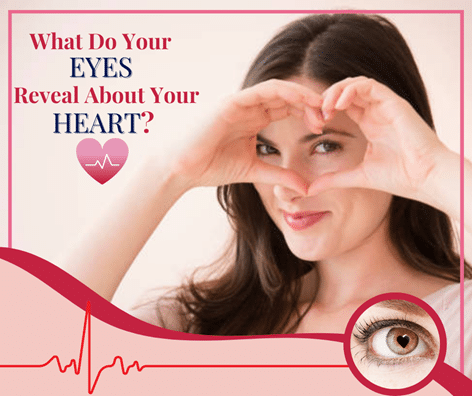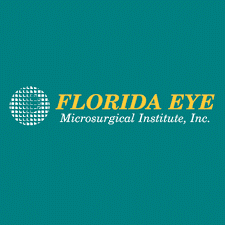Home » News and Events » What Do Your Eyes Reveal About Your Heart?
What Do Your Eyes Reveal About Your Heart?
Posted by: Florida Eye Microsurgical Institute in Eye Health

February often brings thoughts of heart-shaped candies and heart-themed décor for Valentine’s Day, but more importantly, it should make you think about your heart health too! February is Heart Health Month, a time to focus on heart health and disease prevention. Many don’t realize that the eyes and heart are connected. The eyes reveal a lot about someone’s health and often indicate underlying severe health issues, which an eye exam can be a lifesaver.
Major Risk Factors for Heart Disease
- High blood pressure (also known as hypertension)
- High cholesterol and diabetes — can also cause Age-Related Macular Degeneration (AMD), Diabetic Retinopathy, and Retinal Vein Occlusion.
This damage to your eyes can occur for years before you even begin to experience any symptoms. Left untreated, it can permanently impact your sight.
Why We Encourage Patients to Focus on Their Eyes for Heart Health Month
During a comprehensive eye exam, your eye doctor will determine your prescription for eyeglasses or contact lenses and check your eyes for common eye diseases. As well as assess how your eyes work together as a team and evaluate your eyes as an indicator of your overall health. Comprehensive eye exams provide the only non-invasive view of blood vessels and the optic nerve.
The American Heart Association’s “Life’s Simple 7” program targets seven areas that impact heart health and offers tips to reduce your risk of heart disease, which is also beneficial for your eye health:
Manage Blood Pressure
High blood pressure is a significant risk factor for heart disease and stroke. When your blood pressure stays within healthy ranges, you reduce the strain on your heart, arteries, and kidneys, which keeps you healthier for longer.
Control Cholesterol
High cholesterol contributes to plaque, which can clog arteries and lead to heart disease and stroke. When you control your cholesterol, you give your arteries their best chance to remain clear of blockages.
Reduce Blood Sugar
Most of the food we eat is turned into glucose (or blood sugar) that our bodies use for energy. Over time, high blood sugar levels can damage your heart, kidneys, eyes, and nerves.
Get Active
Living an active life is one of the most rewarding gifts you can give yourself and those you love. Simply put, daily physical activity increases your length and quality of life.
Eat Better
A healthy diet is one of your best weapons for fighting cardiovascular disease. Eating a heart-healthy diet improves your chances of feeling good and staying healthy for life.
Lose Weight
You reduce the burden on your heart, lungs, and blood vessels when you shed unnecessary pounds. You give yourself the gift of active living, lower your blood pressure, and help yourself feel better.
Stop Smoking
Cigarette smokers have a higher risk of developing cardiovascular disease. If you smoke, quitting is the best thing you can do for your health.
If you have not yet had your comprehensive eye exam, now is the time! Eye exams are an essential part of health maintenance. If you have noticed changes in your vision, call us today!
This heart health month, say it with your eyes and schedule your eye exam!

References: American Academy of Ophthalmology, American Academy of Optometry, and the American Heart Association. This blog provides information and discussion about eye health and related subjects. The content provided in this blog and any linked materials are not intended and should not be considered medical advice. If the reader or any other person has a medical concern, they should consult with an appropriately licensed physician.
